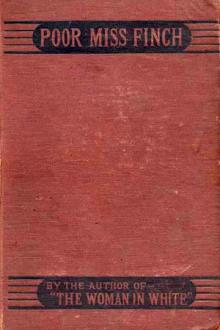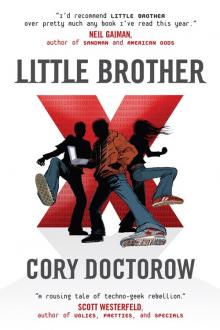Poor Miss Finch by Wilkie Collins (feel good novels txt) 📕

- Author: Wilkie Collins
- Performer: -
Book online «Poor Miss Finch by Wilkie Collins (feel good novels txt) 📕». Author Wilkie Collins
Far from becoming himself again, with time to help him—as the doctor had foretold—Oscar steadily grew worse. All the nervous symptoms (to use the medical phrase) which I have already described, strengthened instead of loosening their hold on him. He grew thinner and thinner, and paler and paler. Early in the month of November, we sent for the doctor again. The question to be put to him this time, was the question (suggested by Lucilla) of trying as a last remedy change of air.
Something—I forget what—delayed the arrival of our medical man. Oscar had given up all idea of seeing him that day, and had come to us at the rectory—when the doctor drove into Dimchurch. He was stopped before he went on to Browndown; and he and his patient saw each other alone in Lucilla’s sitting-room.
They were a long time together. Lucilla, waiting with me in my bedchamber, grew impatient. She begged me to knock at the sitting-room door, and inquire when she might be permitted to assist at the consultation.
I found doctor and patient standing together at the window, talking quietly. Evidently, nothing had passed to excite either of them in the smallest degree. Oscar looked a little pale and weary—but he, like his medical adviser, was perfectly composed.
“There is a young lady in the next room,” I said, “who is getting anxious to hear what your consultation has ended in.”
The doctor looked at Oscar, and smiled.
“There is really nothing to tell Miss Finch,” he said. “Mr. Dubourg and I have gone all over the case again—and nothing new has come of it. His nervous system has not recovered its balance so soon as I expected. I am sorry—but I am not in the least alarmed. At his age, things are sure to come right in the end. He must be patient, and the young lady must be patient. I can say no more.”
“Do you see any objection to his trying change of air?” I inquired.
“None, whatever! Let him go where he likes, and amuse himself as he likes. You are all of you a little disposed to take Mr. Dubourg’s case too seriously. Except the nervous derangement (unpleasant enough in itself, I grant), there is really nothing the matter with him. He has not a trace of organic disease anywhere. The pulse,” continued the doctor, laying his fingers lightly on Oscar’s wrist, “is perfectly satisfactory. I never felt a quieter pulse in my life.”
As the words passed his lips, a frightful contortion fastened itself on Oscar’s face.
His eyes turned up hideously.
From head to foot his whole body was wrenched round, as if giant hands had twisted it, towards the right.
Before I could speak, he was in convulsions on the floor at his doctor’s feet.
“Good God, what is this!” I cried out.
The doctor loosened his cravat, and moved away the furniture that was near him. That done, he waited—looking at the writhing figure on the floor.
“Can you do nothing more?” I asked.
He shook his head gravely. “Nothing more.”
“What is it?”
“An epileptic fit.”
BEFORE another word had been exchanged between us, Lucilla entered the room. We looked at each other. If we could have spoken at that moment, I believe we should both have said, “Thank God, she is blind!”
“Have you all forgotten me?” she asked. “Oscar! where are you? What does the doctor say?”
She advanced into the room. In a moment more, she would have stumbled against the prostrate man still writhing on the floor. I laid my hand on her arm, and stopped her.
She suddenly caught my hand in hers. “Why did you tremble,” she asked, “when you took me by the arm? Why are you trembling now?” Her delicate sense of touch was not to be deceived. I vainly denied that anything had happened: my hand had betrayed me. “There is something wrong!” she exclaimed, “Oscar has not answered me.”
The doctor came to my assistance.
“There is nothing to be alarmed about,” he said. “Mr. Dubourg is not very well to-day.”
She turned on the doctor, with a sudden burst of anger.
“You are deceiving me!” she cried. “Something serious has happened to him. The truth! tell me the truth! Oh! it’s shameful, it’s heartless of both of you to deceive a wretched blind creature like me!”
The doctor still hesitated. I told her the truth.
“Where is he?” she asked, seizing me by the two shoulders, and shaking me in the violence of her agitation.
I entreated her to wait a little; I tried to place her in a chair. She pushed me contemptuously away, and went down on the floor on her hands and knees. “I shall find him,” she said to herself; “I shall find him in spite of them!” She began to crawl over the floor, feeling the empty space before her with her hand. It was horrible. I followed her, and raised her again, by main force.
“Don’t struggle with her,” said the doctor. “Let her come here. He is quiet now.”
I looked at Oscar. The worst of it was over. He was exhausted—he was quite still now. The doctor’s voice guided her to the place. She sat down by Oscar on the floor, and laid his head on her lap. The moment she touched him, the same effect was produced on her which would be produced (if our eyes were bandaged) on you or me when the bandage was taken off. An instant sense of relief diffused itself through her whole being. She became her gentler and sweeter self again. “I am sorry I lost my temper,” she said with the simplicity of a child. “But you don’t know how hard it is to be deceived when you are blind.” She stooped as she said those words, and passed her handkerchief lightly over his forehead. “Doctor,” she asked, “will this happen again?”
“I hope not.”
“Are you sure not?”
“I can’t say that.”
“What has brought it on?”
“I am afraid the blow he received on the head has brought it on.”
She asked no more questions; her eager face passed suddenly into a state of repose. Something seemed to have come into her mind—after the doctor’s answer to her own question—which absorbed her in herself. When Oscar recovered his consciousness, she left it to me to answer the first natural questions which he put. When he personally addressed her she spoke to him kindly, but briefly. Something in her, at that moment, seemed to keep her apart, even from him. When the doctor proposed taking him back to Browndown, she did not insist, as I had anticipated, on going with them. She took leave of him tenderly—but still she let him go. While he yet lingered near the door, looking back at her, she moved away slowly to the further end of the room; self-withdrawn into her own dark world—shut up in her thoughts from him and from us.
The doctor tried to rouse her.
“You must not think too seriously of this,” he said, following her to the window at which she stood, and dropping his voice so that Oscar could not hear him. “He has himself told you that he feels lighter and better than he felt before the fit. It has relieved instead of injuring him. There is no danger. I assure you, on my honor, there is nothing to fear.”
“Can you assure me, on your honor, of one other thing,” she asked, lowering her voice on her side. “Can you honestly tell me that this is not the first of other fits that are to come?”
The doctor parried the question.
“We will have another medical opinion,” he answered, “before we decide. The next time I go to see him, a physician from Brighton shall go with me.”
Oscar, who had thus far waited, wondering at the change in her, now opened the door. The doctor returned to him. They left us.
She sat down on the window-seat, with her elbows on her knees and her hands grasping her forehead. A long moaning cry burst from her. She said to herself bitterly the one word—“Farewell!”
I approached her; feeling the necessity of reminding her that I was in the room.
“Farewell to what?” I asked, taking my place by her side.
“To his happiness and to mine,” she answered, without lifting her head from her hands. “The dark days are coming for Oscar and for me.”
“Why should you think that? You heard what the doctor said.”
“The doctor doesn’t know what I know.”
“What do you know?”
She paused before she answered me. “Do you believe in fate?” she said, suddenly breaking the silence.
“I believe in nothing which encourages people to despair of themselves,” I replied.
She went on without heeding me.
“What caused the fit which seized him in this room? The blow that struck him on the head. How did he receive the blow? In trying to defend what was his and what was mine. What had he been doing on the day when the thieves entered the house? He had been working on the casket which was meant for me. Do you see those events linked together in one chain? I believe the fit will be followed by some next event springing out of it. Something else is coming to darken his life and to darken mine. There is no wedding-day near for us. The obstacles are rising in front of him and in front of me. The next misfortune is very near us. You will see! you will see!” She shivered as she said those words; and, shrinking away from me, huddled herself up in a corner of the window-seat.
It was useless to dispute with her; and worse than useless to sit there, and encourage her to say more. I got up on my feet.
“There is one thing I believe in,” I said cheerfully. “I believe in the breeze on the hills. Come for a walk!”
She shrank closer into her corner and shook her head.
“Let me be!” she broke out impatiently. “Leave me by myself!” She rose, repenting the words the moment they were uttered—she put her arm round my neck, and kissed me. “I didn’t mean to speak so harshly,” said the gentle affectionate creature. “Sister! my heart is heavy. My life to come never looked so dark to my blind eyes as it looks now.” A tear dropped from those poor sightless eyes on my cheek. She turned her head aside abruptly. “Forgive me,” she murmured, “and let me go.” Before I could answer, she hurried away to hide herself in her room. The sweet girl! How you would have pitied her—how you would have loved her!
I went out alone for my walk. She had not infected me with her superstitious foreboding of ill things to come. But there was one sad word that she had said, in which I could not but agree. After what I had witnessed in that room, the wedding-day did indeed look further off than ever.
IN four or five days more, Lucilla’s melancholy doubts about Oscar were confirmed. He was attacked by a second fit.
The promised consultation with the physician from Brighton took place. Our new doctor did not encourage us to hope. The second fit following so close on the first was, in his opinion, a bad sign. He gave general directions for the treatment of Oscar; and left him to decide for himself whether he would or would not try change of scene. No change, the physician appeared to think,





Comments (0)